10 EHR statistics you should know — plus tips for choosing the right system
65% of providers say they would switch from their current EHR.

At a Glance
- 32% of independent practice providers would not recommend their current EHR due to usability and customization issues, highlighting the need for more intuitive and integrated systems.
- Training challenges and lack of vendor support are significant barriers, with 41% of providers citing staff training as their biggest EHR challenge.
- Interoperability remains a critical issue, with 69% of providers experiencing problems, emphasizing the need for EHR systems that seamlessly connect with other practice and local systems.
Electronic health record (EHR) systems are critical for independent practices. At their best, EHRs give physicians the tools and data to manage their practice so they can focus their time and energy on patient care.
Many physicians recognize that EHRs have valuable potential. But many also face design, customization, and configuration challenges with their EHRs. These challenges can contribute to inefficiencies at best and patient harm at worst.
Tebra surveyed 183 independent providers across 6 specialities to understand their concerns and challenges. Overall, we found that providers are dissatisfied with their current EHRs and want substantial improvements.
So what do you need to know about finding an EHR that will support your practice and your patients? Here are 10 EHR stats to keep in mind — and actionable tips to help you in your search.
1. 32% of independent providers would not recommend their current EHR
By now, most physicians use EHRs. But 32% of those Tebra surveyed wouldn’t recommend their current EHR to other providers, while more than 60% would readily switch systems.
Providers described their current EHRs as:
- Not user-friendly
- Extremely outdated
- Difficult to customize
- Slow, with too many clicks and errors
Tip:
Meet with EHR vendors whose systems provide robust features that enhance patient care and streamline operations. Evaluate each EHR based on its ability to deliver in the following key areas:
- Intuitive interface
- Seamless patient record management
- Secure messaging
- Interoperability and integration
- Scalability
2. 41% of providers say that staff training is the most significant challenge with their current EHR
Training in the new EHR is critical to successful implementation. But training also takes time, effort, and resources, which not all practices can afford. This could create a barrier to EHR success.
It’s no wonder then that 4 in 10 of the respondents to Tebra’s survey highlighted staff training as the most significant challenge they face with their current EHR.
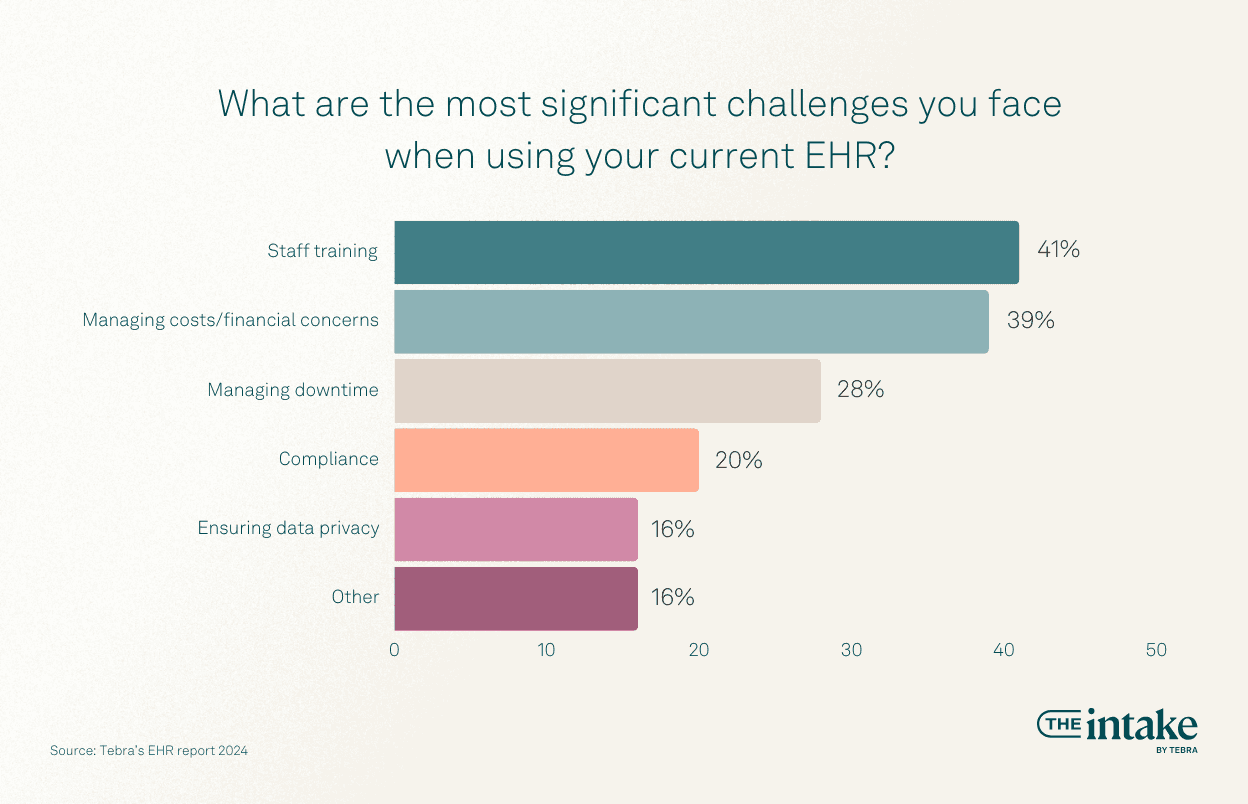
There’s also a general lack of satisfaction with the support from their current EHR vendors. Only 6% of respondents reported being completely satisfied with their vendor’s support.

Tip:
Before committing to an EHR:
- Find out how much training will be required and only proceed if your practice is ready to complete it.
- Evaluate the onboarding, training, and ongoing support the vendor offers.
- Verify that the EHR vendor offers specific guidance on charting to comply with CMS guidelines for evaluation and management visits. These are essential for accurate documentation and ensure your practice meets all regulatory requirements.
- Ensure the vendor will provide ongoing training and support.
3. The most critical EHR integration capability for practice operations is patient scheduling (75%)
Providers Tebra surveyed rated patient scheduling (75%) as the most critical integration capability. The next most important EHR integration was billing and invoicing (72%), which are critical for efficiency, productivity, and profitability.

Tip:
Consider switching to a complete EHR platform that offers a suite of tools and functionalities for clinical, billing, and patient engagement. Tebra offers EHR, telehealth, billing, patient scheduling, feedback, and much more, all in one platform.
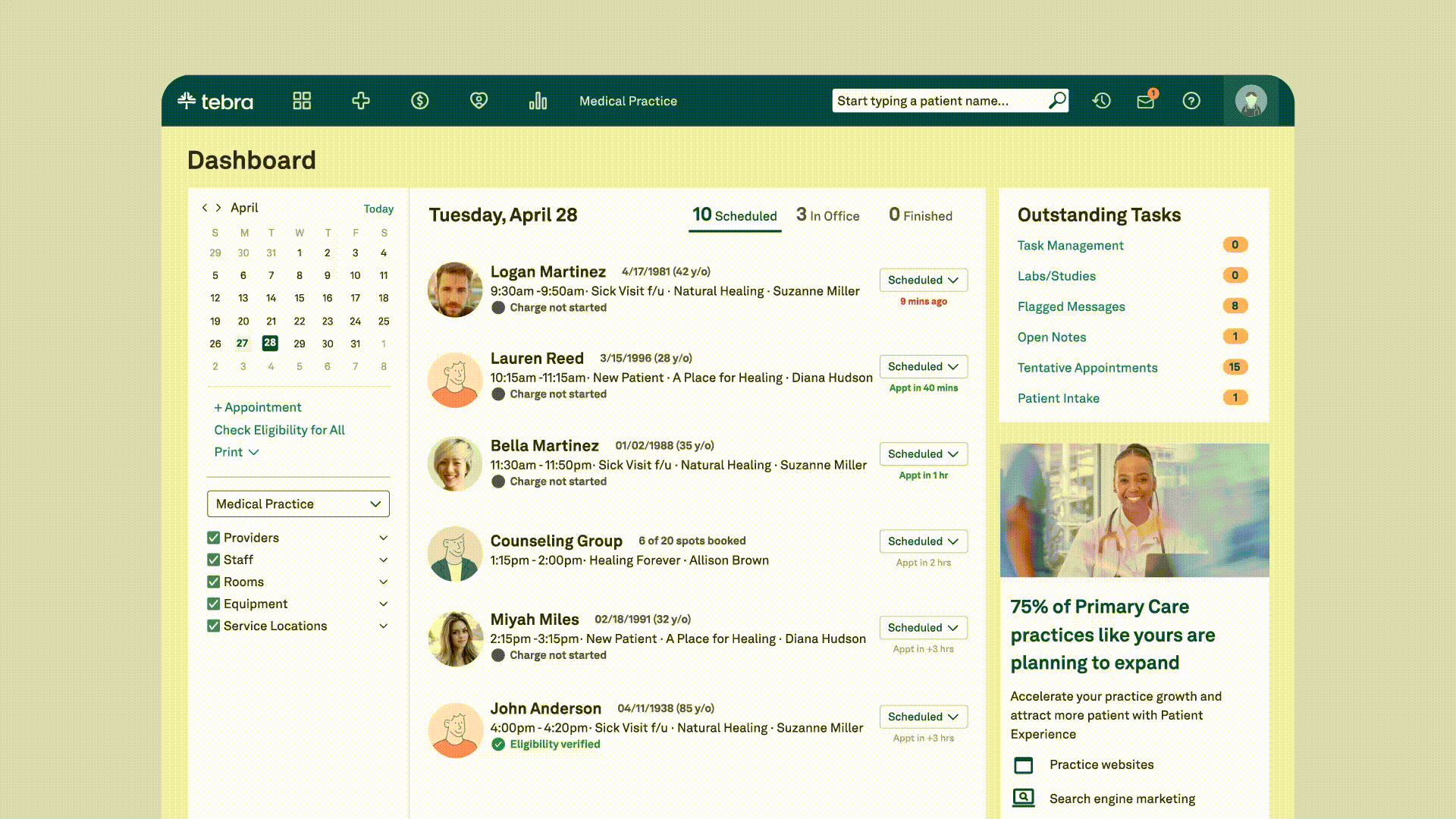
4. 69% of independent providers encounter interoperability problems
In 2018, Stanford Medicine polled doctors about EHRs. 67% of physicians cited solving interoperability deficiencies as the top priority for EHRs in the next decade.
Yet in 2024, 69% of providers still sometimes, often, or almost always encounter significant interoperability challenges between their EHR and other practice and local systems. This can hamper coordination of care, which results in poor health outcomes.

Tips:
- Review any candidate EHR for interoperability and integrations.
- Confirm that the EHR will fully connect to and exchange data with your existing IT systems.
- Ensure that the EHR includes features for HIPAA-compliant sharing of patient data with third parties.
- Verify that the vendor is not only in compliance with HIPAA and other regulations now but also has processes for staying in compliance as regulations evolve.
5. 65% of providers say they would switch from their current EHR
For practices with existing EHRs, 65% report a desire to switch because they’re dissatisfied with their current system. Of these, 65% would switch EHRs to save money, 60% would switch for enhanced functionality, and 54% would switch for a better user experience.
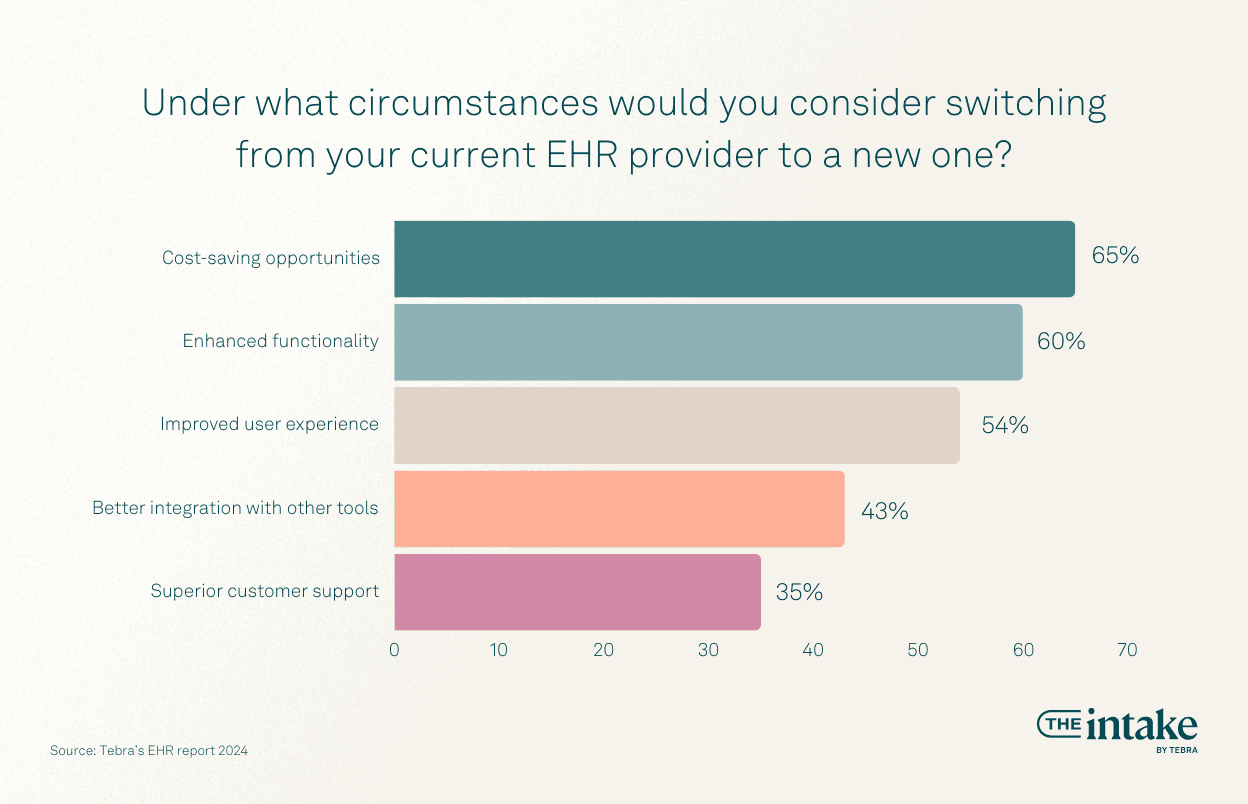
Similarly, practices considering a switch often do so in response to changes in their business, like adding new medical specialties or providers. Such changes require a more feature-rich and adaptable EHR that ensures operational efficiency across services and can accommodate growth.
Tip:
A more modern system, like Tebra — an all-in-one platform built for small practices — can enhance efficiency and create convenience in all areas of your practice operations, helping you deliver better care and improve profitability.
6. 40% of providers say that mobile EHR access is extremely important
If your current EHR lacks mobile access, it’s time for an upgrade. 40% of providers in Tebra’s survey say mobile access is extremely important.
Most modern EHRs offer mobile access, helping providers improve documentation, efficiency, and medical decision-making. Plus, they reduce the total time physicians spend logging into workstations and increase time with patients.
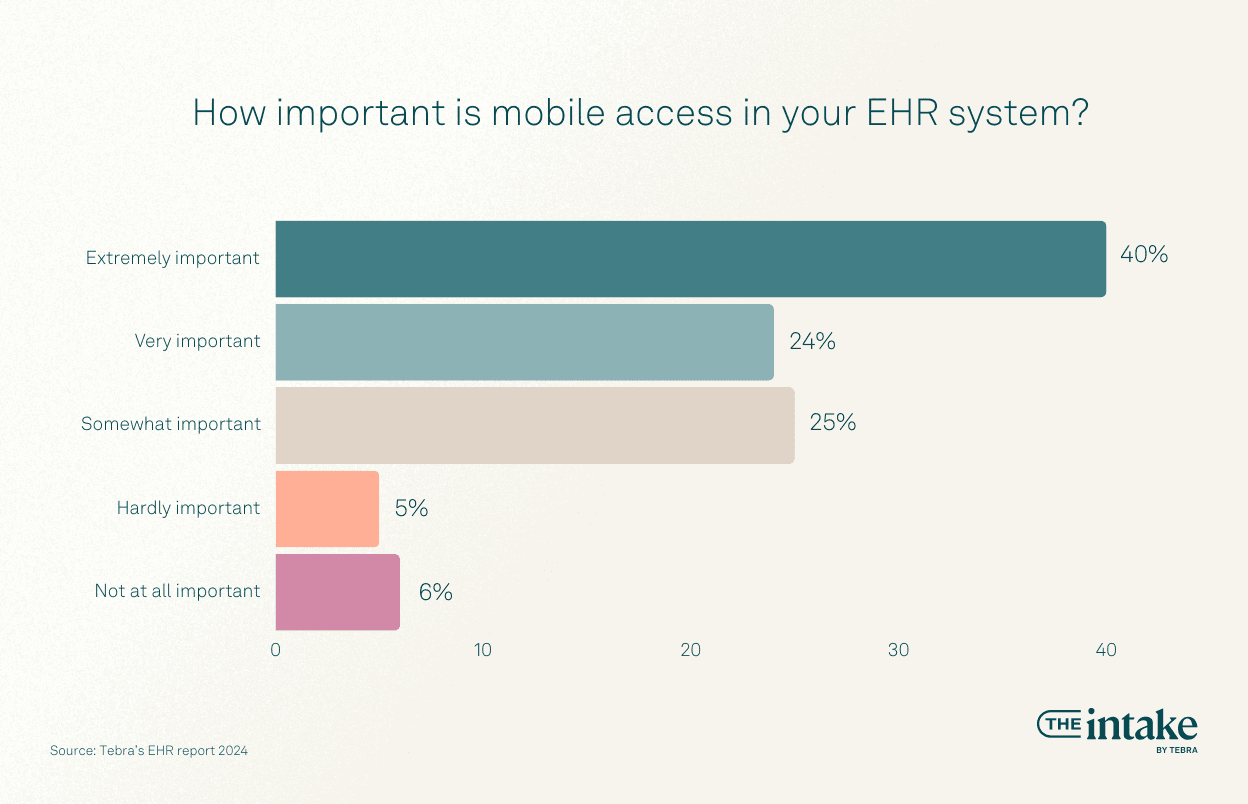
Tip:
Consider an EHR that offers desktop and mobile access. One such example is Tebra, which has a mobile app packed with features that help you manage your practice on the go and improve patient communication.
7. More than 75% of providers spend time in their EHR that would be better spent on patient care
Some providers report spending time in their EHR that they could spend with patients instead. According to Medscape’s Physicians and Electronic Health Records 2023 report, physicians reported EHR-system-driven improvements in managing treatment plans and swiftly responding to patient issues. But they also said that their patient face time and patient counts worsened in an EHR environment.
For 75% of Tebra’s survey respondents, EHRs eat away at the time they’d have spent providing better patient care, with 35% spending 30 minutes to 1 hour on average on tasks within their EHR.
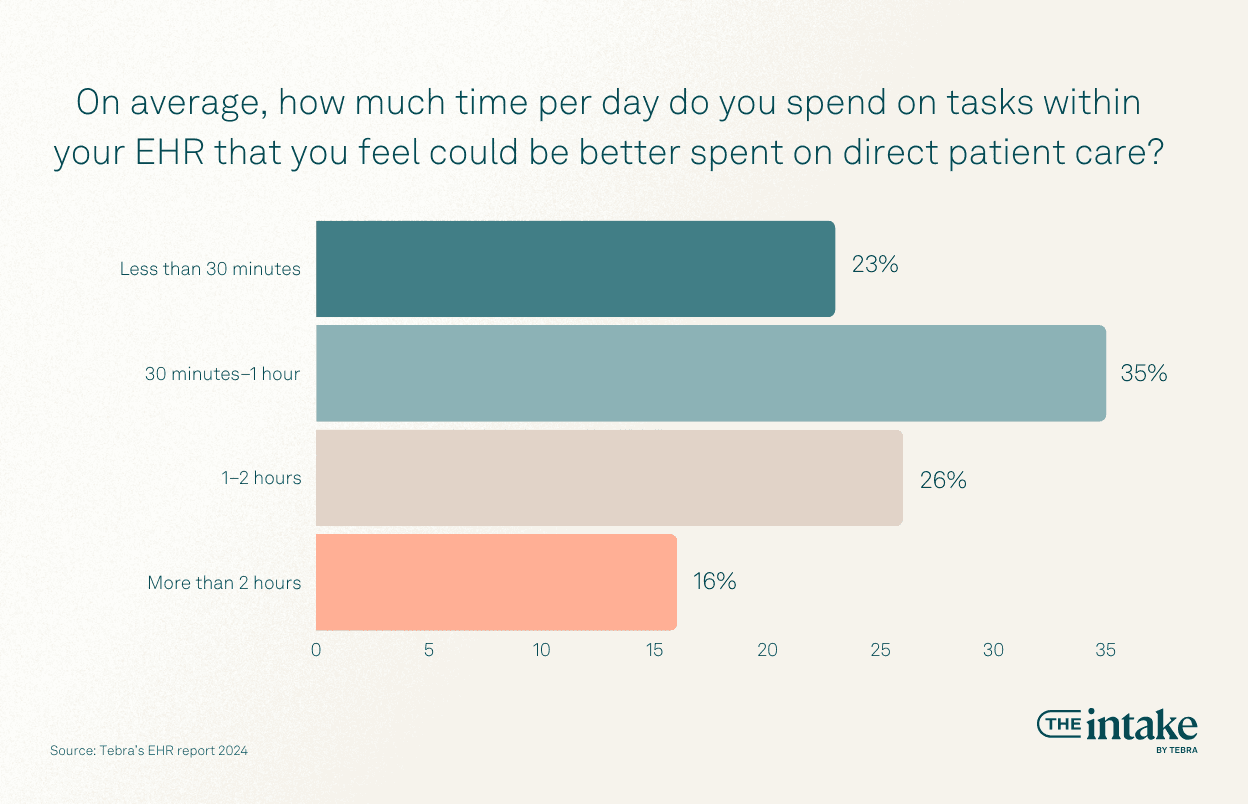
A study published in JAMA found physicians spend at least 5 hours working in the EHR for every 8 hours scheduled with patients, resulting in high physician burnout.
Tip:
Transitioning to a modern EHR with automation capabilities, voice recognition, mobile access, and easy-to-use interfaces can reduce administrative tasks and enhance physician efficiency.
8. 37% of providers would prefer if their current EHR were an all-in-one solution
Over a third of providers prefer more flexible, all-in-one EHRs for integrated practice operations. Also known as complete EHRs, these platforms are purpose-built to drive practice success and modernize the patient journey.

Tip:
If you’re looking for an all-in-one solution for clinical, billing, and patient engagement, consider getting a complete EHR system. It may include extra features — which increase the cost — and have a steeper learning curve, but the benefits significantly outweigh any costs and drawbacks.
Complete EHRs integrate all necessary functionalities and reduce the complexity of and potential errors with managing multiple systems. Moreover, having a single complete EHR system enhances efficiency, freeing you up to focus more on patient care than on administrative work.
9. Usability and customization is the most essential EHR feature
Nearly half (45%) of providers surveyed want usability and customization in an EHR.

They face usability issues, like difficult navigation, poor interface design, lack of customization, slow performance, and inefficient data entry in their current EHRs. They want a better user experience.
Tip:
Evaluate each candidate EHR platform based on usability and functionality. Determine if the system offers robust features that streamline operations and enhance patient care. It should deliver in these key areas:
- Confidentiality and security
- Charting
- Prescriptions
- Lab and results management
- Clinical decision support and quality improvement
10. 12% of providers consider their EHR moderately difficult to use
Poor EHR usability is the number one complaint of most healthcare professionals, according to an EHR performance study published in JAMA. The study also shows EHRs that are difficult to use are less likely to catch medical errors that could harm patients.
12% of providers in Tebra's survey also consider their EHR moderately difficult to use.

Tip:
Narrow down the pool of potential vendors to a selection of 5–10 and see whether you can get a free trial or guided product demo. This will give you a no-commitment opportunity to see whether the EHR might fit your practice than simply reading a list of its features.
Choose the right EHR for better practice operations
Selecting the right EHR system for your independent practice is a key decision that impacts daily operations, long-term success, and sustainability.
Combating EHR system challenges requires a substantial time commitment, preparation, research, and strategic evaluation of potential options and vendors.
Download our EHR selection and implementation guide for more on how to select the best EHR for your practice.
You Might Also Be Interested In
Learn how to create a seamless patient experience that increases loyalty and reduces churn, while providing personalized care that drives practice growth in Tebra’s free guide to optimizing your practice.
Subscribe to The Intake:
A weekly check-up for your independent practice

Suggested for you
Get expert tips, guides, and valuable insights for your healthcare practice








